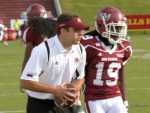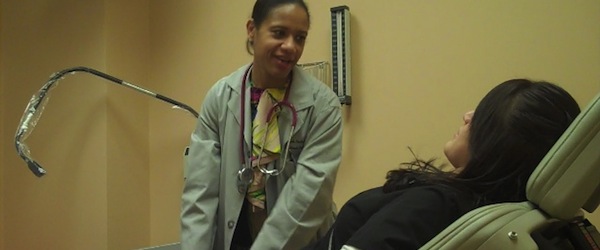Football coaching jobs are rewarding, demanding and stressful!
Sports coaching jobs share many things in common regardless of the sport or the level of play: a good coach will have a passion for the sport and know the game well, will have a strategic mind, good communication skills and people skills, as well as the ability to handle stress and stay focused. Anyone interested in sports coaching careers will enjoy today’s interview with inspirational defensive backs coach Mike Rutenberg of New Mexico State University.
SNEAK PEEK (Full Episode below)
|
RELATED CAREERS |
Today’s Guest
 Coach Mike Rutenberg: New Mexico State Aggies
Coach Mike Rutenberg: New Mexico State Aggies
College Major: Hospitality Management
College: Cornell University in Ithaca, NY
High School: Landon School in Bethesda, MD
First Job Ever: Filing & shredding paper at his dad’s company
Worst Job Ever: Packing boxes in a hot warehouse with no A/C
Sports Coaching Jobs
Coach Rutenberg shares great, inspirational advice for everyone regardless of their interest in sports related jobs. He is an example of the importance of integrity, a strong work ethic, following your passions, and being willing to sacrifice to achieve your goals. It’s amazing what Coach Rutenberg has achieved at such a young age – he’s only 28 – but you can tell how much he enjoys football coaching and how hard he’s willing to work to achieve success. Check out this great profile from USA Today on Coach Rutenberg.
For students interested in sports coaching jobs and college football coaching jobs, Coach Rutenberg suggests studying some things that might surprise you: he advises taking classes in communications, presentations, management, leadership, finance and law! He explains why these are good for sports coaching careers in the full interview. Below you’ll find our full video interview plus a transcript, audio podcast and jobs!
FULL EPISODE (#19)
For our Audio Podcast: Careers Out There on iTunes
TRANSCRIPT OF TODAY’S INTERVIEW
How Coach Rutenberg Broke In To College Coaching Jobs 3:00-6:05
Typical Day for a College Football Coach 6:05-10:00
Rewards and Challenges of College Coaching Jobs 10:00-15:06
Skills & Personalities for College Coaching Jobs 15:06-16:50
Income for College Coaching Jobs 16:50-18:33
Education for College Coaching Jobs 18:33-21:16
Breaking In To College Coaching Jobs 21:16-24:35
Keys to Success for Sports Coaching Careers 24:35
Careers Out There Host Marc Luber: Hey everyone – welcome to Careers Out There – I’m your host Marc Luber and we’re helping you find a career that fits you. Today we’re gonna learn about sports careers- and we’re gonna specifically focus on being an assistant football coach. Our guest is Mike Rutenberg, he’s an assistant football coach for New Mexico State University. It’s gonna be a great show so stick around! [theme song] Alright -we’re back with Mike Rutenberg. Mike, welcome to Careers Out There!
New Mexico State University Assistant Football Coach Mike Rutenberg: Thank you – thanks for having me.
[THE ROLE OF AN ASSISTANT FOOTBALL COACH starts at 0:36]
Host Marc Luber: Alright – so tell us a little bit about what it means to be an assistant football coach.
New Mexico State’s Defensive Backs Coach Mike Rutenberg: Alright. Currently I’m the Defensive Backs coach at New Mexico State. I’m responsible for the defensive backs: corners and safeties. We also have a Corners coach who works with me and does a great job. I’m responsible for them on the field, off the field, in the classroom, in the neighborhood, in the community and it’s my job to get them to produce on the football field and help us win games. It’s my job off the field to help them get their degree, to help them lead good lives as young men, help them mature and develop and be productive people in society. Also I’m responsible for recruiting an area: and that area for me is Los Angeles: San Fernando and San Gabriel valley, and on top of that I’ll also recruit defensive backs across the country.
Luber: It’s a big job!
Coach Rutenberg: It’s a big job but it’s fun.
Luber: Right. And how much time is spent where you’re with the players versus where you’re with other coaches or on your own?
Coach Rutenberg: Well the NCAA gives you a rule: that you can only spend a certain amount of time with your players. So we use that time with our players on a daily basis in defensive meetings and position meetings with the defensive backs – we’ll break it up even more – I’ll work with the safeties and the other defensive backs coach will work with the corners. We’ll do a lot together, and then we go out on the field for practice, or we have them for all of practice – within practice we’ll have them as defensive backs together for 30 minutes and we may break up and then go into defense and then against the offense or against the scout team. And then once meetings and practice are over, the players are on their own to work on their studies or whatever they may be involved in in the community. And as coaches, we’re together all the time. Defensive staff room is like our home away from home – so we’re in their constantly.
Luber: And how many are there of you?
Coach Rutenberg: On an NCAA coaching staff, you’re allowed 10 coaches including the head coach. So there’s 9 full time assistant coaches and including the head coach is 10. Then you’re allowed graduate assistants, so there’s a defensive graduate assistant, which is the position I started at at UCLA and an offensive graduate assistant, as well as support staff. On defense there’s, including the head coach who works with us, there’s 4 of us on defense. [corrects later to say 5 on defense]
[HOW COACH RUTENBERG BROKE IN TO COLLEGE COACHING JOBS starts at 3:00]
Luber: So you were with Coach Walker at UCLA? Is that right?
Coach Rutenberg: Yes.
Luber: And then you followed him over?
Coach Rutenberg: Yes – I was actually with him at the Washington Redskins. He was a defensive backs coach and I got to know him then – I actually picked him up for his interview. I really took a liking to him and he did to me. And he really took me under his wing. When he went to UCLA to become the defensive coordinator, I followed him there and we were there for 3 years. When he became the head coach at New Mexico State, I was lucky enough to have the opportunity to come here with him as a full time coach.
Luber: Nice. I’m sure a lot of people who are watching can tell you’re young – you’re not even 30 yet, right?
Coach Rutenberg: No – I’m 28.
Luber: OK – so they’re all wondering OK, how does someone get to do this? Where did this all start for you?
Coach Rutenberg: Well for me it started as a life-long dream. I think everybody says, “oh yeah, everybody’s got a dream” but this is all I ever wanted to do. I don’t think I watched cartoons. I didn’t really play with toys. I mean I watched SportsCenter, football and ESPN. And then, you know, playing in high school, this was all I wanted to do. I wasn’t the greatest player but I understood the game and I really paid a lot of attention to film study – and then the same in college. After my sophomore year at Cornell, I got an internship with the Redskins and I just tried to run with it and do a lot more than what was asked of me and tried to get as many responsibilities as I could. I never wanted to go home from the office and was lucky enough to go back after my junior year. I interned in the scouting department and again just tried to be a bulldog and do as much as I possibly could. I was lucky – I went back for my spring break and I worked the draft. Instead of going away to a cool place during my winter break I worked for the Redskins and then went back after graduating from college as an intern – not making a whole lot of money and worked my way up from there.
Luber: That’s exciting. Now tell us – I think you said to me earlier that you did a lot of doodling in high school – you were drawing out plays on your notebook in class. Is that right?
Coach Rutenberg: Yeah, that was more in college.
Luber: In college? OK.
Coach Rutenberg: Yeah, in college. Not that I wasn’t paying attention!
Luber: Ha! Of course.
Coach Rutenberg: I had my notebook and I was always drawing plays and trying to come up with new plays or fitting defenses to the plays that I came up with or drawing up a new blitz…so I just really have a passion for the game and the strategy of the game.
Luber: You know it’s funny – I want everyone watching to know – we interviewed someone recently who is kind of known as Odd Todd. He’s a freelance animator – so he does animation for Time Magazine’s website, ABC News on television and NPR’s website and lots of other places – and he said that he used to doodle in class in high school and college – and he was always doodling cartoons! And so now he’s doing that for a living – and you were doodling back then and now…..So I want people who are watching – I don’t want to encourage them to not pay attention to their teachers of course when they’re sitting in class – but you CAN take those little things that you’re all geeked out about – that you’re really passionate about – and you can turn that into your career! You really can!
Coach Rutenberg: Absolutely.
[TYPICAL DAY FOR A COLLEGE FOOTBALL COACH starts at 6:05]
Luber: So talk to us about a typical day. Walk us through – you know – you wake up in the morning – what’s it like? You go to work….what happens?
Coach Rutenberg: Alright – I wake up in the morning – I’m lucky that I live about 10 minutes from the office. I always make my cup of coffee here and it’s usually done by the time I get to the office so..I’m in the office between 7 and 7:30 and I have another cup of coffee. Coach is great – he gives us some time before – we usually have an 8:00 staff meeting. And I’m spending about 30 minutes just getting organized, catching up on anything I might have left from the night before or you know prepare for the staff meeting or taking care of something that I would have to take care of. Just getting my thoughts in order and then we usually have an 8:00 full staff meeting which will go for about 30 minutes where Coach reviews the schedule for the day, any thoughts he has, any reminders he has for the staff….And then once he’s done with that we’ll break up into offense and defense and we’ll get together as a defensive staff. Let me correct myself – there’s 5 of us on defense, not 4 of us – there’s 5 of us. The 5 of us will be in the room and we’ll start game planning for our opponent starting with the base and moving to the most complex: into 3rd down and red zone and we do each: 1st and 2nd down, 3rd down, and that goes each day. …And then we have to prepare for practice and draw up practice cards and make practice scripts. And that will usually go up until about 1:00 where guys can either break for lunch or get a workout or keep working. As coaches, we’re grinders – we’ll usually work right though lunch…..up until our meetings which begin in the early afternoon. And then you’re in meetings with the players and practice with the players and once practice is over it’s back in the office – we’ll grab dinner in the office or dinner will be brought in to us and we’re back watching the practice film which takes 2 or 3 hours. And we usually have a quick little break and we’re starting on whatever the game plan is for that night. Maybe it’s 3rd down and we’re starting on opponent 3rd down and that can go until 10:00, sometimes 11, sometimes Midnight just depending on how we’re going…and I usually try to spend 30 minutes on my own reviewing what we went over and getting ready for the next day.
Luber: Wow – that’s a full day!
Coach Rutenberg: Long day!
Luber: Yeah! And when you’re with the players, how much of it are you taking the mentoring role, are you taking the shouting out at them role, are you taking the buddy role? How does that all play out? That relationship thing?
Coach Rutenberg: Yeah – that’s a unique relationship: player-coach. I think you have to have a little bit of everything you said. Number 1: You need to develop these kids as young men. And we’ve got a great group here in New Mexico State – I love them. So there’s a mentorship role of teaching young men how to act and they’ve obviously been brought up well with their parents but now they’re ours. Just teaching them about the normal importancies of life on a day-to-day basis. But we’re also football coaches – we need to produce on the field. And that’s where the coach aspect comes in. But there’s still mentoring involved in that. But as a coach, you know, you need to provide them with the information they need about our own scheme, about what the opponent’s doing and then how to execute it through technique and what tempo to do it at and get them really to make plays on the football field. And then on top of that, there’s the academic side. You need to encourage them academically, you need to provide a good game plan for them academically and monitor that game plan. I think between development and maturity, being a football player and academics, that’s the best way to approach the players.
[REWARDS AND CHALLENGES OF COLLEGE COACHING JOBS starts at 10:00]
Luber: And other than the fact that you’re living your dream, what’s the most rewarding aspect of this path?
Coach Rutenberg: I’ve gotta say there’s 2 Marc: I mean winning is the most rewarding thing. That’s why we’re here. That’s why they call us “coach”. But right there with that is watching these guys grow up and develop in front of your eyes. You can go from recruiting a kid as a senior in high school, being in his home with his family, being at his high school and then getting him to New Mexico State or wherever you’re coaching, and then watching him grow up as a freshman, sophomore, junior, senior and then graduate! And I think that’s a great aspect – I think it exists in pro coaching too in a different way. A couple years in the pros you watch some great coaches develop young men and even grown men at that time. So I think between the NFL and college, there’s a unique element of developing people which is equally rewarding.
Luber: Interesting. What about the biggest challenge? What would be the thing where you would weed people out and say, “if you can’t handle this, then this coaching path is definitely not for you” – what would that be?
Coach Rutenberg: You’ve gotta be able to handle stress on really a minute-to-minute basis. We only have a college football: 12, and in the NFL: 16, opportunities to see the fruits of our labor. And a 6-6 season in college football doesn’t get you to the national championship. Usually it’s a 12-0 season. It’s not going to win you a conference either. So the wins and losses become so important. On top of that, what people don’t understand is a Tuesday of practice if you don’t feel like you practiced well, something happened in practice that wasn’t good, you might have lost that day – you can’t recover it – you’ve gotta work around it. And that creates a lot of stress. You have to be able to cope with stress. On top of that you’re tired. It’s long days us coaches put in. And you’ve gotta be able to manage all those different things because on Saturday, or in the NFL on Sunday, you want to be able to coach fresh and do a great job at the game.
Luber: Now at the game, I always wonder this when I’m watching a coach – no matter what sport it is – because of the stress, because there’s so much going on, because you’ve gotta be so focused, what’s going on in your head? Are you able to enjoy the moment? Are you able to soak it all in and have fun with it the same way the audience is? Or are you so incredibly focused that you can’t even think about the whole thing until it’s all over with?
Coach Rutenberg: You definitely can’t enjoy it like a fan could! But I think in the front 3 quarters of your brain it is all focused on the moment and the future of the game. In the back of your brain, I’m sure subconsciously I am enjoying it because this is what I love to do – but 95% of my thoughts are geared to what’s happening on the field in that particular play, what might have happened on a previous drive, a previous quarter, and what we think is going to happen – and then how we’re gonna manage that with our players on the sideline or at half time. The game is unbelievably stressful. I will guarantee you most coaches come out of the game with a pretty serious headache. But that headache goes away pretty quick if you win!
Luber: I’m sure it does! And what do you do to deal with that stress? Is it just work out? Like sneak a workout in in the middle of the day?
Coach Rutenberg: Absolutely. I think as I’ve matured a little bit in this profession, working out is key during the day. Just to give yourself 30 minutes – whether it’s before practice or after practice – just to kind of free your mind. I always find myself when I’m working out – whether I’m on the treadmill or just out for a run – I’m thinking about football and I’m thinking about what I have to do for the rest of the day – or what I’ve done or how I’m gonna teach this coverage or what my practice drills are gonna be – but I’m in a freer mindset. Or maybe I’m thinking about a recruit – or I know I want to call a recruit that night – but my mindset is much freer. And that does alleviate some of the stress. I think during a game you’ve really just gotta control your emotions, try and breathe slowly and slow everything down to alleviate some of the stress during a game.
Luber: And during a game, what specifically are you doing? What is your role? Are you on the field? Are you in the booth? Where are you?
Coach Rutenberg: For the last 4 years, I’ve been in the booth. So I’ll speak about the booth. Being in the booth as a secondary coach, you’re focused on watching the secondary and really the back 7 linebackers and defensive backs in the pass coverage and in their run and seeing how they’re reacting to what the offense is doing. And you need to see what is the offense doing and what you think the offense might be doing against your defense to predict what calls might be successful and what adjustments you need to make. So during the game I’m focused on the secondary and then I also work with Coach Walker on end game adjustments by what they’re doing and what tendencies we had on them as compared to what they’re doing now during the game.
Luber: And after the game, you mentioned earlier about watching practice films after practice. What about watching game films?
Coach Rutenberg: Coming in Sunday after a game, you’re gonna watch – first on your own and then as the defensive staff since I’m a defensive coach – the previous game. So if we just played Utah State we’re gonna watch that game, we’re gonna grade it, we’re gonna meet with our players and review that game with them. And then as soon as that’s over, you’re on to the next week’s opponent. So if it’s San Diego State, for example, then you start preparing for that team on Sunday evening. I’ll start watching the film. I’m responsible for the pass game. I’ll begin drawing up the opponent passes and that will take me through Sunday night into Monday morning when I’ll begin a lot of the studying that I do –whether it’s I formation or personnel – football lingo. And then we’ll meet as a staff pretty much all day Monday watching film. And then that repeats itself Tuesday morning. Prepare for practice, watch film, study the opponent, put together the films for your players so they can learn in the classroom. We call them teach tapes. As of Tuesday, Wednesday, Thursday, Friday night before the game – if we have meeting time, we’re gonna watch film with our players. Saturday, if it’s a night game, we’re gonna have morning meeting time – we’re gonna watch film with our players. So everything we do is based off of film.
Luber: And how do you know what you’re looking for when you’re watching the film?
Coach Rutenberg: Well, I think #1 experience. Having learned how to coach this position, really going on me my 5th year working with the defensive backs, you just learn what are the little keys that might help your players. So you start with the general of what are they trying to do schematically. When are they throwing long passes? When are they throwing short passes? It’s a little more complicated than that, but this is in common terms. When are they running the ball? When are they passing the ball? Then you can get really intricate – out of 21 personnel, pro, what are they doing? And you look at it formationally based, down and distance based, who’s in the game? It can get a lot more complicated than that – I wouldn’t want to bore you with that – but there’s certain keys that you’re looking for on a play-by-play basis to help your players. Where are people lined up, what’s their stance?
[SKILLS & PERSONALITIES FOR COLLEGE COACHING JOBS starts at 15:06]
Luber: OK, now in addition to dealing with the stress, for other people who want to do what you do – they’re watching right now, no matter what age they are – high school, college, out of college, what are the personalities and skill sets that they really need to have if they’re gonna go this route?
Coach Rutenberg: Sure. I think #1 in whatever route you’re going, you’ve gotta be a good person. You’ve gotta have integrity. You’ve gotta be honest. And you’re gonna be successful with that. But in specific to coaching, I think #1 you’ve gotta be a people person. On a daily basis, I’m dealing with 10-11 other coaches on the staff, I’m dealing with support staff, administrative staff, and you’re dealing with your players. And you deal with all – the great thing about coaching football is you deal with all different kinds of players: players from different parts of the country, players from different backgrounds…and you’ve gotta have people skills to be able to do that. Along with people skills you’ve gotta have communication skills: when is it time to raise your voice, when is it time to lower your voice, when’s the time to say a lot, when’s the time to say a little. And those things I think are very underrated because those can be very forceful. You’ve gotta have work ethic – you have to be able to work hard and be willing to make sacrifices necessary – I can’t tell you how many weddings I’ve missed…I’ve missed funerals…because they’re during the season – and you can’t get away really during the season. So you have to be willing to sacrifice, work late hours, and the last thing I’d say is you have to have – and I mentioned this earlier – just the ability to cope on a daily basis with the highs and lows of this profession. You can’t ever get too high, you can’t ever get too low. If you really approach it even-keeled, knowing when it’s time to get emotional or back off, I think you can be successful.
[INCOME FOR COLLEGE COACHING JOBS starts at 16:50]
Luber: Excellent advice! What about money? You were in USA Today – you were profiled there and they talked about the rough road of salary on your path there and where you are specifically. Talk about that and you can be as open or not open as you want but if you can give people an idea of what they could really envision – it’s not like you’re stepping into millions of dollars the day you become a coach – so tell us about that.
Coach Rutenberg: Sure. I think to be a football coach, you need to be willing to take some jobs that might not be as financially exciting as maybe some other jobs – some jobs that maybe your friends might be going for. A lot of coaches have started off like I did as an intern and then a graduate assistant coach where you’re not making a lot of money. As a graduate assistant coach – and this is public information – you’re gonna be making $10,000-$12,000 a year at pretty much any university in the country – and that’s public information. As an intern, you’re probably going to be making similar amounts of money. And then as you move up into assistant coach positions and then coordinator positions and hopefully head coaching positions obviously the money increases. But you’re not gonna be paid a lot of money and you’re gonna be putting in a lot of hours as a younger, more novice coach. I think you’ve gotta be willing to do that. And then in the NFL, the pay scale raises – but again, as a young coach in the NFL – like I was as a young scouting assistant, I was making peanuts! But then as you move up and deservedly so, there’s more money as you move up the ranks.
Luber: So you’ve just gotta pay your dues.
Coach Rutenberg: You’ve gotta pay your dues. You’ve gotta pay your dues.
[EDUCATION FOR COLLEGE COACHING JOBS starts at 18:33]
Luber: Talk about educational backgrounds. You went to Cornell University and you’re a graduate of their famous hospitality program –excellent program! I assume that that is not the typical background of most football coaches. What would you say is more typical and what would you say people need to have who want to go that route?
Coach Rutenberg: I get asked that question all the time Marc. And a guy who I coach with gave me the best advice: there is no typical path. You kind of have to blaze your own path. Now along with that a great thing to do is to read about some of these great coaches out there and how they got there. There are unbelievable coaches who are assistant coaches, coordinators and head coaches in college football and the NFL and at every level of college football – and read their bios – get on the internet – and you young people – I mean I’m young too – you can get on the internet and read about a coach immediately! But the #1 you’ve gotta do is you’ve gotta get a college degree. You have to get an undergraduate degree. I believe in college football you can’t even be an assistant coach without an undergraduate degree. So you’ve gotta get a degree. I don’t think there’s one specific degree you need – I don’t think there’s one degree path you need. But what I would encourage is to take some leadership classes, some management classes, some communication classes, some presentation classes – I do a ton of public speaking in front of the defensive backs – that’s public speaking! Pre-game giving a fire and brimstone speech is public speaking. I do a ton of presentations. As coaches we’re teachers. So every day I’m presenting on a camera, through Powerpoint, through the use of film and media – so take a presentations class. I write a lot and build a lot of lists and outlines – take a writing and documents course. And then I would encourage young people out there to take as many different classes as they can. I’m not gonna say that a finance class is directly gonna help me teach defensive backs how to backpedal, but I know the problem-solving that I went through in that finance class and the big problem that I squeezed down to a little problem in that one equation definitely helped my thinking! I took a lot of law classes – you study a big case, figure out how to read 100 pages in 10 minutes, come up with a 2 sentence answer off a 30-page response. That all applies to the skills you need in coaching football.
[BREAKING IN TO COLLEGE COACHING JOBS 21:16]
Luber: That is an excellent answer! That’s very helpful! I’m sure everyone watching is gonna appreciate that. That’s some real good advice – because that helps them kind of plot it out and just figure out this is what I’ve gotta do, this is where I’ve gotta go, take this kind of class….so I hope you guys watching are paying attention – that’s really good advice that Mike just gave. Mike tell us about an action plan. What’s an action plan? Let’s say someone is ready right now. Two action plans! One for the person who is kind of finishing school and they want to get in just like you…..and then the action plan for someone who is maybe 15-16 in high school and they’re doodling and they’re dying to go out there and do what you do one day and you know, you mentioned the classes….if there’s anything else anybody should be doing to work their way towards what you do.
Coach Rutenberg: So the first one: If you’re just finishing school, the thing I would encourage you to do is get involved with a football program immediately. Now I understand how competitive it is to do that, but if you’re just graduating from a college, your easiest bet is probably to go to the athletics department or the football coach – if you played football for that coach you’ve got a great in – and ask to help out. Ask if they have any graduate assistant coaching jobs open, do they have any internships open, can you help in the office, can you answer phones….get a job in the program. Fold envelopes, lick envelopes, it doesn’t matter – get involved! Once you’re in there, show that you can do a lot more than that because the more you show you can do the more people are gonna give you. And at some point after doing that you’re gonna have to really try in college football to get a graduate assistant job at any level – guys, it doesn’t matter what level – hopefully that will lead to an assistant coaching job – and then you’ll be lucky enough to get an assistant coaching job in the NFL…..Another thing I want to encourage is to be involved with sports. So maybe you can’t get that first coaching job in college. Go to your local high school where you played high school job, the local high school where you went to college – get involved. High schools are always looking. If that doesn’t work, look up camps. Use Google. There are a million football camps out there. Every college in America has them , there are private camps, pro players put on camps, send out as many letters as you can to get involved in those camps. And then like you said the younger person: if you’re in high school, I would encourage you to play high school football. If you want to be a football coach, you should have some football background. You don’t have to – but I think it would help. If you’re lucky enough to play in college, try that – it doesn’t matter what level – but playing college football is a great experience and you’ll learn a lot. On top of that, as a younger person when you’re in college, try to work internships. Go to the athletic department and get involved with the football team. If you’re playing for that football team, ask the coach if you can stay around in the summer and help him with breaking down film or helping him with recruiting. If you have to be there anyway, cause you’re a student there, maybe there’s a local high school that you can go help out in. You probably can’t do it every day if you’re playing football, but maybe go in the off season at a local high school and teach them a couple plays and then work with that local high school. And then any type of internship you can get in college in sports: It doesn’t have to be just being a football coach. Like I said: maybe work a camp, maybe work for a news channel that covers it, maybe work in the communications department of your athletic department. There’s a million different paths – but you’ve gotta be involved – because nobody’s gonna hire anybody without experience.
[KEYS TO SUCCESS FOR SPORTS COACHING CAREERS starts at 24:35]
Luber: Very very good. That’s great advice! Definitely! Close us out with some keys to success for everybody. What are some good keys to success?
Coach Rutenberg: Within coaching or within life?
Luber: Let’s do both!
Coach Rutenberg: Alright – I don’t know if I have all the answers, but let’s start within coaching. The first thing is you’ve gotta work. You’ve gotta come to the office every day with the attitude that you’re gonna give it everything you’ve got. I always like to say when I go to bed at night – Greg Williams taught me this – I always give him a shout-out – when you put your head down at the end of the night, you’ve gotta be able to say, “I gave it everything I had today.” So a work ethic is gonna be a key to success. Doing the right thing – not cutting corner. You have an assignment: execute the assignment! Don’t try to get the easy way out. Don’t try to go behind somebody’s back to do it – just do the assignment. If you need help, ask. But do the assignment. The other thing I would say in coaching is be a people person. Be nice to people. Help people. Help the other coaches. Work with the players. If you see a young coach struggling, give him a hand. Help the head coach – he’s got a lot on his plate. In life: I always say this and I’m repeating myself, but you’ve gotta be a good person. I just don’t think you can succeed in life not being a good person – I know you can’t. Live your life – however you want to do it. I mentioned earlier: I live it by work. This is my passion. I don’t have a lot of other hobbies. But live your life in a way that’s gonna fulfill you on a daily basis. Create whatever balance you need – it doesn’t need to be 50/50 work and play. Maybe it’s 80% work and 20% play, but have a game plan in life. And that’s the last thing I have to say: have a game plan. In coaching, you need a game plan and in life you need a game plan. And if you can work towards each little goal in your game plan: if something goes bad, back up a little bit. Oops! Messed that up – let me try to work this out – let me make a phone call to somebody who’s done this well before – oh that’s a good way. Let me read a book about it – one thing I do – I read a ton of books about head coaches and I get great ideas. So that would be my game plan and I hope it helps everybody.
Luber: That’s excellent advice. Very helpful for everybody. Tell us what’s in store for you in in the next month or so, Mike.
Coach Rutenberg: Sure – well we’re about to start training camp – actually just a couple days away from this interview. Got a couple weeks of camp and we’ll be getting ready for our season opener September 11.
Luber: Who you playing?
Coach Rutenberg: San Diego State.
Luber: Excellent. Well good luck with that and good luck this whole season! I’m sure the whole audience is gonna wish you the same. Thank you so much for joining us – we really appreciate it.
Coach Rutenberg: Thank you. Thank you for having me.
Luber: Everybody as always here at Careers Out There you get real advice from real professionals like Coach Mike Rutenberg here. Mike thanks again. Everybody I’m Marc Luber. Look forward to seeing you again soon. Take care!
(C) 2010 Careers Out There
RELATED POSTS
How Team Sports Is Like the Workplace
Writing Careers: Interview with Writer-Author Brad Herzog
Musician Jobs: Session Musician & Professional Cellist Talks Success in the Music Business








Hello I was wondering if there were any open GA posiions at the university for football..
I am 34, what is the best way for me to get into coaching? I’ve coached youth football for 8 years and would like to get into coaching full time.
Hi Joshsube. I’m not sure what level of coaching jobs you’re interested in. I know this interview was really focused on college level coaching careers, but Coach Rutenberg talks about breaking in to coaching careers around 19 minutes in to the full version of the interview. You can also check out the transcript above. He suggests that high schools are always looking for coaching help and that colleges have camps that can use people. Check it out – I hope it helps!
great interview. very helpfull, inspiring and informative. thank you.
Thanks Brandon. Thanks for taking the time to share your feedback! Glad it was helpful.
I am currently pursuing my degree in sport managment and have been looking everywhere on how to break into coaching full time this video hit the nail right on the head thanks marc -Robert
That’s great – thanks for sharing Robert. Good luck!
hi i am 19 i played in my high school football team and i really not trying to play any more but i will love to coach football i think this is the right move for me and the interview i saw makes me want to try this even more to become the best that i can be at it
Thanks for sharing @ab5c80b3d690e13b47e38c03d54b090e:disqus! Glad it was helpful.
Great to hear. Thanks for posting @7dc8cdcb0c7a27676e4094fcc98bf536:disqus and good luck to you.
Great interview.. Thank you..!!!